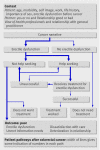Men's experience of erectile dysfunction after treatment for colorectal cancer: qualitative interview study
- PMID: 22010127
- PMCID: PMC3273733
- DOI: 10.1136/bmj.d5824
Men's experience of erectile dysfunction after treatment for colorectal cancer: qualitative interview study
Abstract
Objectives: To examine the experiences of men after treatment for colorectal cancer, identify barriers to accessing services, and suggest improvements to providing information in primary and secondary care.
Design: Semistructured, qualitative interview study with purposive sampling and thematic analysis.
Participants: 28 patients treated for colorectal cancer.
Setting: West Midlands.
Results: Most men treated for colorectal cancer experience erectile dysfunction as a consequence. Not all, however, want the same response from health professionals. Although, erectile dysfunction is profoundly stressful for most men, affecting self image, behaviour, and relationships, some do not regard it as a health priority. Many of the men were uninformed about erectile dysfunction and were unprepared for it, and the majority neither helped themselves nor asked for help. Almost none were receiving adequate, effective, and affordable care. Evidence of ageism was strong.
Conclusions: Unlike patients with prostate cancer, men with colorectal cancer are not routinely offered information and treatment for erectile dysfunction. Greater coordination of care and consistent strategies are needed to tackle the unmet needs of this widely diverse patient group. Currently, clinicians are inadvertently neglecting, misleading, and offending such patients; better training could improve this situation, as might the reorganisation of services. Further research is needed to determine whether trained clinical nurse specialists in colorectal cancer units could coordinate ongoing care.
Conflict of interest statement
Competing interests: All authors have completed the ICMJE uniform disclosure form at
Comment in
-
Erectile dysfunction after treatment for colorectal cancer.BMJ. 2011 Oct 18;343:d6366. doi: 10.1136/bmj.d6366. BMJ. 2011. PMID: 22010129 No abstract available.
References
-
- Cancer Research UK. Bowel (colorectal) cancer—UK incidence statistics. 2010. http://info.cancerresearchuk.org/cancerstats/types/bowel/incidence/.
-
- Cancer Research UK. Bowel cancer statistics—key facts. 2010. http://info.cancerresearchuk.org/cancerstats/types/bowel/index.htm?scrip....
-
- Payne S. Not an equal opportunity disease—a sex and gender-based review of colorectal cancer in men and women: part I. J Mens Health Gend 2007;4:131-9.
-
- Ellis R, Smith A, Wilson S, Warmington S, Ismail T. The prevalence of erectile dysfunction in post-treatment colorectal cancer patients and their interests in seeking treatment: a cross-sectional survey in the West Midlands. J Sex Med 2010;7:1488-96. - PubMed
-
- Davison BJ, So AI, Goldenberg SL. Quality of life, sexual function and decisional regret at 1 year after surgical treatment for localized prostate cancer. BJU Int 2007;100:780-5. - PubMed
Publication types
MeSH terms
LinkOut - more resources
Full Text Sources
Medical

